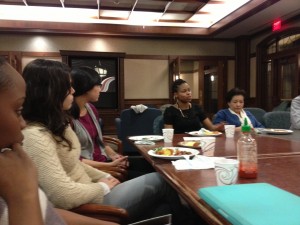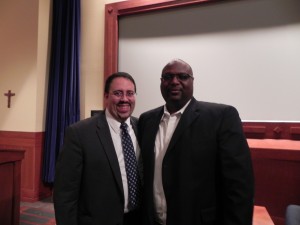Sunday, most ND students left campus after watching an exhilarating game between ND and USC despite the rain. Some were homebound for rest, home cooked meals and socializing with family members; others opted to remain on campus or participate in one of the numerous seminars offered by the Center for Social Concerns. ND students give generously of their time and talents to help those deemed disenfranchised, while on campus or during breaks.
Throughout my tenure at Notre Dame, I have been impressed by the students who take advantage of the CSC seminars or volunteer opportunities within the targeted communities. Those who experience a true immersion view these events as a chance to partner with the communities to help and learn from the residents. Several ND students shared how they were graciously welcomed into the homes of residents, where stories of celebration and trials were shared. The students emerged enlighten, more appreciative of their lot in life and with a deeper understanding of the phase “but by the Grace of God.”
When we are in these situations and in a contemplative mood, how are our personal values challenged? Do they supersede what we are witnessing or experiencing? Do they shift, because our worldview has been augmented? Or are we kinder, because we realize the world is “bigger than us?” Does this challenge us to take a stance that would positively affect not only those we feel are in need; but also our peers?
Whether you are in Appalachia, Chicago, Home under the Dome, or with family, think about what you stand for, who has “your back” and whose “back” do you have? Monday, November 4 begins the GRC’s Stand Against Hate week campaign. The theme covers a variety of discriminations from economic to gender to racial issues. In support of this effort, the November 6 Interrace Forum will address “The Power of Kindness” at 5:30 p.m. in the Coleman Morse Student Lounge. Please rsvp to join us for dinner and discussion at msps@nd.edu with Interrace in the subject line.
November is filled with lectures and events hosted by MSPS and student groups. The month begins with Black Images, a talent show, on November 2 following the Navy game; Asian Allure, talent and cultural fashion show, November 8 & 9 in Washington Hall. University of Baltimore Law School Professor F. Michael Higginbotham will discuss “Ending Racism in “Post Racial” America” on November 14. The Native American Students of Notre Dame are sponsoring several events in honor of Native American Heritage Month. Watch for more information in regard to these and other activities.
As we prepare to give thanks for our blessings, remember to offer deep appreciation for the opportunity to expand our horizons and perspectives.
Peace,
Iris L. Outlaw
Iris L. Outlaw `90 MSA
Director
Multicultural Student Programs and Services


